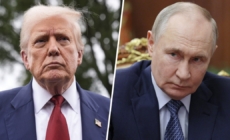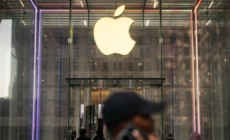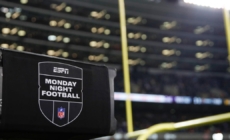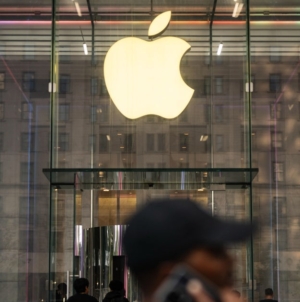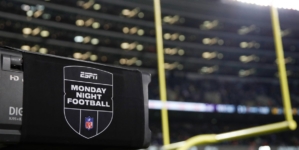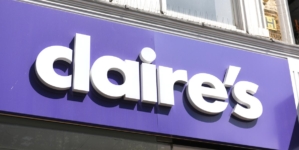-
Every Celebrity in Photos from Inside Jeffrey Epstein’s Townhouse - 29 mins ago
-
Trump Sends Envoy to Meet Putin as Sanctions Deadline Looms - 35 mins ago
-
Series of earthquakes rattle Inland Empire - 41 mins ago
-
Micah Parsons to Rams? Aaron Donald Return? Cowboys Star, NFL Legend Discuss It - 47 mins ago
-
Jack Osbourne shares heartfelt tribute to father Ozzy after his death - 49 mins ago
-
Trump, Apple to announce new $100 billion commitment to manufacturing in U.S. - 56 mins ago
-
Gen Zer Wants To Bring Back Vintage Millennial Style, Divides Opinion - about 1 hour ago
-
Terrifying Video Shows Flash Flooding Tear Through Village in India - about 1 hour ago
-
Michael Rapaport defends ‘Euphoria’ star Sydney Sweeney over American Eagle ad - 2 hours ago
-
Last Night in Baseball: Can Anyone Stop The Brewers? - 2 hours ago
Trump claims banks discriminate against conservatives through debanking. Here’s what that means.
President Trump on Tuesday claimed that major banks are discriminating against conservatives — including him — through the act of debanking, or when financial institutions refuse to work with some individuals or businesses or abruptly close clients’ accounts.
Mr. Trump made the comment in an interview with CNBC on Tuesday, after he was asked about a report by the Wall Street Journal that said he would soon sign an executive order aimed at stamping out debanking. Mr. Trump claimed that JPMorgan Chase gave him 20 days to close his account, although he didn’t specify when this occurred or what reason he was given by the bank for doing so. He also claimed that Bank of America refused his business after he left JPMorgan.
The issue of debanking has become a sticking point for some conservatives who claim that they’ve been unfairly targeted by financial institutions. Debanking can occur for a number of reasons, such as if a financial institution detects potentially fraudulent activity or the account owner is overdrawn, but some conservatives claim they have been rejected due to their political views.
“They discriminated against many conservatives,” the president told CNBC.
Bank of America CEO Brian Moynihan rejected such allegations of bias against conservatives, in a recent interview on CBS News’ “Face the Nation with Margaret Brennan” that took place ahead of Mr. Trump’s comments on CNBC. Moynihan pointed to the nation’s second-largest bank’s massive customer base as evidence of its diverse clientele. He also emphasized the impact of federal regulations, in addition to concerns over legal and financial risk, on banking decisions.
“We have 70 million consumers, and we’re the biggest small business lender. That’s not — the issue they’re focused on is the regulators impact on this industry. And you heard Senator Scott talk about this this week. This reputation, this after the fact, look, that you banked x, and now after the fact, you’re gonna say x didn’t turn out to be what you thought,” the CEO told Margaret Brennan. “So we look at it. We look at it based on risk. People may feel those decisions are made for some other reason, but we always make it on what’s best for our company, what’s best for our client.”
At a Senate hearing in February over the issue, Sen. Tim Scott, a Republican from South Carolina, said debanking harms individuals as well as the economy, and violates the principles of fair market access. Debanking has also been highlighted by some crypto investors, such the CEO of crypto platform Anchorage Digital, who testified in the Senate hearing that his bank had closed his company’s account on short notice because they weren’t comfortable with crypto transactions.
The White House declined to comment on the EO.
JPMorgan Chase said in a statement that it doesn’t close accounts for political reasons, adding that it agrees with Mr. Trump that “regulatory change is desperately needed.” It added, “We’re pleased to see the White House is addressing this issue, for which we’ve been advocating for many years, and look forward to working with them to get this right.”
Earlier this year, Bank of America said, “Political beliefs are not a factor in account closure decisions.” Referring to the reported EO, the bank said in a statement that it welcomes “regulatory clarity” from the Trump administration.
Reached for comment on Mr. Trump’s recent comments, Bank of America pointed to its earlier statement.
What happens when someone is debanked?
Debanking isn’t just happening at banks, said Nicholas Anthony, a policy analyst at the libertarian-leaning Cato Institute.
“This can be something that happens to you at a credit union, at a cryptocurrency exchange or anywhere else really,” Anthony said. “It’s just having that sudden abrupt closure of your financial account where you’ve been, and essentially kicked out of the system or cut off from the system.”
Banks are not required by law to give account owners a reason for why their account is being closed. Under the Bank Secrecy Act, banks are obligated to track their customers’ activity and file a so-called suspicious activity report (or SAR) if they notice anything unusual. Banks aren’t allowed to disclose to customers if there’s a SAR, which can leave some people in the dark if their account is shut for this reason.
“It’s a terrible feeling to suddenly have this relationship cut off, and you really don’t know why,” Anthony said. “In a lot of cases, it’s by federal law that banks can’t tell you what happened, and you’re kind of left to just spiral there.”
How many people are impacted by debanking?
More than 8,000 consumers filed complaints with the Consumer Financial Protection Bureau during the last three years related to their financial institutions’ “improperly closing checking, savings or other deposit accounts,” according to a February analysis from the U.S. Senate Committee on Banking, Housing and Urban Affairs.
By comparison, consumers made about 1.3 million complaints about credit reporting in 2023 alone, according to CFPB data.
Why do banks close accounts?
Banks can close accounts if they suspect fraudulent or suspicious behavior, or if a customer violates their terms. In the complaints cited by the Senate banking committee analysis, some consumers said they had faced overdraft fees due to overdrawn funds before their banks shuttered their accounts, for example.
But there’s no data that tracks whether people or institutions are debanked due to their political views, although there are anecdotal accounts, experts said.
“There is no actual data or proof that conservatives are being debanked for their beliefs,” Jeremy Siegel, senior associate at research firm Pleiades Strategy, told CBS MoneyWatch. “In fact, Florida set up a hotline for this very reason, and got zero complaints. A Virginia Credit League Lobbyist said this in his testimony against a similar bill in Virginia.”
Banks set risk tolerances and conduct their business within those perimeters, added Shayna Olesiuk, director of banking policy at Better Markets, a financial advocacy group.
“They must always understand and manage any risk that they are accepting in their business activities and decisions; this could include things like financial risk or unlawful or discriminatory activity,” she added.
What about political views and debanking?
There have been allegations from some conservatives that their political views led to account closures. The attorney general for Kansas, Kris W. Kobach, sent a letter to Bank of America last year, alleging discrimination by the bank of religious groups he states had their accounts closed without explanation.
Banking policies appear “to be systematically punishing religious and political views with which it disagrees,” the Kobach claimed in the letter.
But some of these organizations had red flags that could have led to the debanking, such running a debt collection business outside of the U.S., Cato’s Anthony added.
“There are anecdotal cases of conservative account holders that have had their accounts closed, but at the same time, we see that with others as well,” he added. “There’s been a longstanding history of people who are Muslim having their accounts denied, people with Russian last names or Middle Eastern last names for that matter, having their accounts denied.”
“It seems to be a widespread issue in the sense that it affects all different sorts of people,” Anthony said.
Source link

